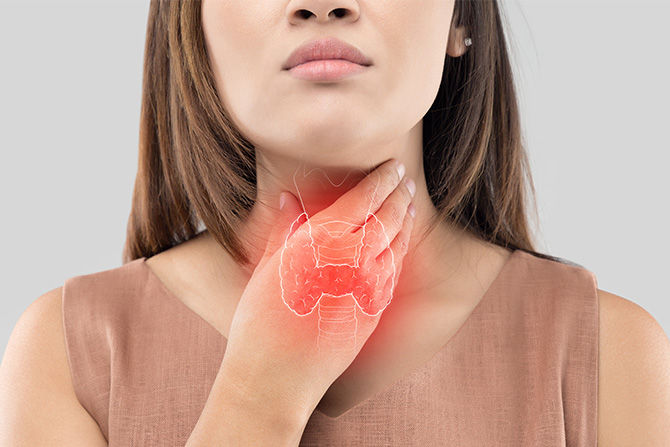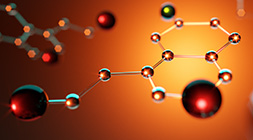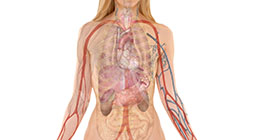
Overview
Symptoms
Causes
Diagnosis
Prescription
Health Tips
Hypothyroidism occurs when the thyroid gland produces too little thyroid hormone. The thyroid is a small gland that lies below the Adam’s apple in the neck and wraps around the trachea. It secretes hormones that are crucial for the control of the body’s many metabolic functions. Thyroid hormones stimulate the production of proteins and increase the use of oxygen by cells in the body. These hormones come in two main forms: thyroxine (T4) and triiodothyronine (T3). Most T4 is converted in the liver into the active form of thyroid T3. About 80 percent of T3 is produced via the liver and the other 20 percent is produced directly by the thyroid.
A careful recycling process occurs in the thyroid to ensure that adequate thyroid hormones are available. Because thyroid hormones affect every cell in the body, a delicate balance must be maintained to keep a steady metabolic rate in the body. The hypothalamus and pituitary glands work in concert with the proteins of the body, T4, the liver, and other organs to maintain that balance. Either a deficiency (hypothyroid) or an excess (hyperthyroid) will result in many symptoms.
Hypothyroidism is a common condition in North America, particularly in Canada and the northern U.S. where levels of sunlight are low for much of the year, and soil mineral depletion is common. Low thyroid function affects approximately 20 to 25 percent of the female population and about 10 percent of males. An additional 30 percent of persons over the age of 35 may also have sub-clinical or mild hypothyroidism whereby their thyroid stimulating hormone (TSH) is within normal range, but they have many of the symptoms of low thyroid.
When the thyroid produces too much thyroid hormone, hyperthyroidism develops. Autoimmune reactions against the thyroid can cause hyperthyroidism. Graves’ disease is one such condition in which the immune system malfunctions causing an increase in thyroid hormone. The result is a goiter; a greatly enlarged thyroid gland. Thyroiditis, an inflammation of the thyroid gland, can initially cause hyperthyroidism, but eventually the damage to the thyroid caused by the inflammation causes hypothyroidism or low thyroid function.
Thyroid Hormones
The following hormones and substances directly affect the thyroid or are released by it:
- Thyrotropin-releasing hormone (TRH) is secreted by the hypothalamus, a brain centre that coordinates the actions of the nervous and endocrine systems. TRH triggers the pituitary to secrete TSH.
- Thyroid stimulating hormone (TSH) is secreted by the pituitary in response to TRH. TSH stimulates the production of thyroid hormones and the growth of thyroid cells (excess TSH causes thyroid enlargement, or goiter).
- Calcitonin is a thyroid hormone involved in the homeostasis of blood calcium levels. It lowers the amount of calcium and phosphate in the blood as needed, by inhibiting bone breakdown and accelerating the assimilation of calcium. Calcitonin stimulates movement of calcium into bone in opposition to the effects of parathyroid hormone. Thus, the thyroid is involved in bone health and diseases such as osteoporosis.
- Thyroxin (T4) is the most abundant thyroid hormone and is manufactured in the thyroid gland. It is synthesized from tyrosine and includes four molecules of iodine per molecule of thyroxin hormone. Thyroxin activates bone breakdown, and is necessary for digestion, brain, heart, and muscle function, as well as many other functions.
- Triiodothyronine (T3) is the most active thyroid hormone, with four to ten times the activity of T4. It includes three molecules of iodine per molecule of triiodothyronine hormone. Twenty percent of T3 is produced and secreted by the thyroid gland and the other 80 percent is converted from T4 in the liver and other organs. Many factors contribute to the conversion of T4 to the more active T3, including liver health, low stress levels, the types of foods you consume and more.
At any given time, most T3 and T4 molecules in the body are bound tightly to blood proteins. Only a small amount of each circulates as a “free” hormone that is physiologically active. For example, unbound T4 accounts for approximately 0.05 percent of total T4. Unbound hormone levels are seldom measured by medical doctors, yet these levels are most accurate for determining thyroid function.
All hormones interact with one another, which is why it is important to ensure proper hormone levels to support thyroid health. For example, too much cortisol causes an increase of estrogen; too much estrogen inhibits thyroid hormone.
Symptoms
There are many possible symptoms of a low thyroid. The symptoms experienced and severity of symptoms will vary from person to person.
- A metallic taste in the mouth
- Anemia
- Anxiety/nervousness
- Chronic fatigue, weakness, lethargy
- Cold hands and feet, cold intolerance, low body temperature
- Constipation
- Cracking in the heels and skin
- Depression and irritability
- Doughy abdomen
- Dry, coarse skin, hair, or both
- Edema (swelling of eyelids or face)
- Elevated cholesterol levels
- Feeling unable to breathe deeply
- Goiter (enlarged thyroid)
- Hair loss
- Headaches and dizziness
- Heart palpitations
- Hormonal imbalances
- Impaired memory
- Infertility and/or recurring miscarriage
- Insomnia
- Low progesterone-to-estrogen ratio
- Low T3, T4 or T7
- Night sweats
- Poor concentration
- Poor vision
- Presence of thyroid antibodies
- Racing thoughts
- Severe menopause symptoms that last for years without relief
- Slow pulse
- Slower metabolism (may show up as weight gain, either general or on the hips)
- Sudden change in personality
Low Thyroid Function and Hormonal Problems: It is common for the thyroid to be functionally, or even clinically, out of balance in women who experience hormone-related problems such as premenstrual syndrome (PMS), infertility, ovarian cysts, fibroids, endometriosis, fibrocystic breasts, dysmenorrhea (menstrual pain), menorrhagia (heavy bleeding), amenorrhea (absent periods) or perimenopause/menopausal symptoms. Unfortunately, most women are given synthetic estrogen for their hormone complaints. This further shuts down the thyroid, as high estrogen levels interfere with the thyroid hormones, particularly the utilization of T3, the more potent biologically active form of thyroid hormone.
Back in the days before fertility drugs, when a woman could not get pregnant or had recurring miscarriages, doctors prescribed thyroid hormone with some success. Women who suffer post-partum depression could also benefit from thyroid hormone as childbearing can often exhaust the adrenals and promote low thyroid.
Women with low thyroid are at serious health risk for many other conditions including osteoporosis, breast cancer, heart disease, hormone problems, severe hot flashes and more. In addition, nutritional therapies do not work as well in those with an underactive thyroid.
Diagnosing a Low Thyroid
Clinical Hypothyroidism or Suboptimal Low Thyroid
A diagnosis of clinical hypothyroidism (low thyroid) is made when a TSH blood test indicates TSH levels are higher than 5.5 to 6.0. The range of normal for most TSH tests is 0.5 to 5.5 or 6.0, depending on the state or province. This determination of normal for TSH is too broad and many labs are adjusting their reference ranges to show that a TSH above 2.0 is indicative of low thyroid function. High TSH levels indicate hypothyroidism because the pituitary is pumping out TSH in an effort to stimulate the thyroid into action.
When laboratory tests show results that fall in the normal range, or the TSH is above 2.0, yet the patient has classic symptoms of low thyroid, this is considered to be suboptimal function of the thyroid. Many women deal with classic low thyroid symptoms for several years before the TSH test gives them a reading of 5.5 or higher, indicative of clinical low thyroid. It would be best if physicians do not rely solely on test results but also look at the symptoms the patient is presenting.
In Canada, most doctors test only the TSH level due to financial constraints in the national health plan. If a TSH level is within this definition of “normal” limits, further thyroid tests are not performed. Yet it is quite common for patients to have normal levels of TSH and T4 but low T3 levels. It’s also important for T3 and T4 levels be tested in order to obtain an accurate picture of thyroid health, especially if there is any vagueness about a TSH reading. Estrogen, cortisol, and progesterone levels should also be evaluated to determine a low thyroid diagnosis.
Many people who have all the signs of low thyroid function may never receive appropriate treatment because the traditional lab tests are insensitive to early changes in function. Abnormal TSH, T3, or T4 levels are rarely found in the multitude of patients with low thyroid function.
T4 is the most abundant thyroid hormone (fifty times more T4 is present in the body than T3), but T3 is far more active. Many people are unable to convert T4 into T3 at the rate needed, and will continue to experience symptoms of low thyroid function even when they take medication that normalizes TSH levels. This is because the medication does not increase the T3 level. For additional information on T3, Dr. E.D. Wilson’s book “Wilson’s Syndrome: The Miracle of Feeling Well” is a great choice.
Thyroid Hormone Test Ranges
| Total T4: | 5.4-11.5 mcg/dL (57-148 nmol/L) in adults |
| Free T4: | 0.7-2.0 ng/dL nanograms per deciliter (ng/dL) |
| Total T3: | 80-200 ng/dL (1.2-3.1 nmol/L) in adults |
| Free T3: | 260-480 pg/dL (4.0-7.4 pmol/L) |
Home Thyroid Testing
In addition to the lab testing mentioned above, there are effective and easy methods that can be used at home.
Basal Temperature Test
Research on basal temperature as the most accurate measurement for thyroid function was conducted by Dr. Broda Barnes, who has more than forty years of clinical experience with thyroid patients. The thyroid regulates the rate of metabolism in nearly all cells, therefore, the basic body temperature is a reliable window on thyroid function. Men and non-menstruating women can take the test on any day, but women who are menstruating should take the test on the second, third or fourth day of their period. Monitoring basal temperature is a simple, inexpensive method to evaluate thyroid function and is achieved in this manner:
- Shake down the basal thermometer the night before and leave it at bedside.
- Measure temperature first thing after waking in the morning, and before rising.
- Immediately on waking, place thermometer under the arm/armpit and leave it there for 10 minutes.
- The temperature should be recorded every morning for at least one week.
Women who are menstruating should take the test on the second, third, or fourth day of their period.
Normal basal temperature averages between 36.5 and 36.7° C (97.7 and 98.6° F). If the average temperature is below the normal range then a hypothyroid state could be indicated; a temperature above this range could indicate a hyperthyroid state.
If a blood test indicates thyroid-stimulating hormone (TSH) level is above 2.0 while basal temperatures are low, and additionally some or many of the symptoms of low thyroid hormone are experienced, then one is most likely suffering from low thyroid function.
If a blood test indicates TSH is under .05 and the basal temperature is higher than normal, this may indicate the thyroid is working too hard and is overactive. Hyperthyroidism usually precedes hypothyroidism because the thyroid becomes tired and has to slow down if it is worked too hard for too long. Those with a hyperactive thyroid must work with their doctors to treat this serious condition.
Iodine Test
This simple test can be conducted at home using topical iodine available from a pharmacy:
- Just before bedtime dab a small amount of iodine to the skin (the inner arm works well) and allow it to dry.
- Leave it on overnight.
- After eight to ten hours of sleep, a dramatic difference in the colour of the iodine swab may be seen by morning.
- If the iodine is absorbed by morning (the skin colour at swab site is normal), a thyroid function problem may be indicated.
Causes
Hashimoto’s thyroiditis is the most common cause of hypothyroidism. Hashimoto’s causes the autoimmune system to attack the thyroid, and eventually the thyroid cannot produce enough thyroid hormone. The treatment of hyperthyroidism using radioactive iodine and surgery is the second most common cause of hypothyroidism.
Tumors or growths on the pituitary or thyroid may also cause hypothyroidism, and more rarely, a genetic defect whereby damaged thyroid regulating genes cause low thyroid.
Certain medications such as, Lithium, Amiodarone, and Interferon-alpha cause the thyroid to become low.
Reduced intake of iodine is a cause of hypothyroidism. Iodine is required by the thyroid to produce thyroid hormones. Decades ago, iodine was added to salt expressly for the iodized salt to treat goiter and subsequent thyroid problems. Today, many people are no longer eating iodized salt and as a result an increase in hypothyroidism has occurred.
Stress, anemia, estrogen replacement, birth control pills, and other medications that block iodine uptake are associated with an increase in hypothyroidism.
Those living in the northern hemisphere have higher rates of low thyroid. This may be due to not getting enough sunshine to produce vitamin D, a cofactor in thyroid hormone production. As a result, these people are more prone to hypothyroidism. There are also trace minerals (noted below) that are required to make thyroid hormone, and deficiencies in any of these may promote hypothyroidism.
Exposure to high levels of environmental toxins affects liver function. The liver’s ability to eliminate toxic compounds, and therefore support good thyroid function depends on the strength of its detoxification systems, which in turn are directly influenced by diet and lifestyle.
The Thyroid and Adrenal Connection
The thyroid-adrenal feedback interaction is orchestrated by the nervous system. Stressors on the body and the resulting chronic secretion of cortisol from the adrenal glands have a negative impact on the thyroid gland. When cortisol goes up, estrogens increase and block the uptake of thyroid hormone.
Stress on the adrenals has negative effects on the thyroid, causing reduced uptake by thyroid hormone receptors and low thyroid hormone output. Adequate amounts of thyroid hormone are needed to create proper cortisol function and vice versa. So interdependent are these two hormones that they share many of the same symptoms of deficiency or excess when they are not in balance.
When the adrenal glands are overworked due to stress, working too much, not enough sleep, or a poor diet, the body converts progesterone into adrenal hormones which depletes the body of progesterone. Thyroid hormones and progesterone feed information back to the pituitary, helping to balance other hormones and thereby help the adrenals with stress adaptation which, like the thyroid, are stimulated by the pituitary. When progesterone levels are low because of progesterone’s conversion into stress-fighting hormones, the thyroid suddenly has to take on the task of sending hormones to the pituitary with little outside help.
As noted, the thyroid determines the body’s metabolic rate. If the adrenals are depleted, the thyroid will force them to maintain the proper rate. However, this type of pressure on the endocrine system over time leads the thyroid to decrease hormone production in order to conserve energy. When this first happens, symptoms of low levels of both adrenal and thyroid hormones occur. If the symptoms are not addressed, over time they will come to be predominantly related to one gland or the other— usually the thyroid.
Prescription for Health
Diet
A diet based on good sources of carbohydrates, fats, and protein is key to supporting healthy thyroid and adrenal function. Use the following tips to reinforce healthy food choices and ensure optimum health.
- Avoid all artificial sweeteners, including sucralose and aspartame. Use only natural sweeteners like xylitol and stevia.
- Avoid all regular soy foods as they contain goitrogens, which cause a decrease in the absorption of iodine. Fermented organic soy foods are fine (including tempeh, miso, soy sauce, and fermented soy yogurt and powders).
- Avoid refined foods at breakfast, including breads (especially those made with refined flours), refined breakfast cereals, and concentrated carbohydrates such as instant oatmeal and fruit juices.
- Breakfast should be predominantly protein, such as boiled or poached free-range eggs, a protein shake, yogurt with protein powder added, or a chicken breast.
- Consume foods rich in the mineral iodine. The thyroid needs iodine to make thyroid hormones. Iodine-rich foods include beef, lamb, and beef liver (hormone-free); eggs; raw nuts and seeds; seafoods (such as clams, oysters, sardines, and other saltwater fishes); sea vegetables (such as wakame, hijiki, kelp, nori, arame, and dulse); and fresh fruits and vegetables, especially green peppers, lettuce, and pineapple. Raisins contain iodine as well.
- Consume high-quality free-range, organic or wild protein. Lunch and dinner plates should contain a piece of protein and lots of green vegetables.
- Eat plenty of complex carbohydrates in the form of dark-colored vegetables and whole grains such as millet, amaranth, oat grouts, brown rice, and buckwheat.
- Use only pure, cold-pressed organic oils, including flaxseed, extra virgin olive oil, borage, and sesame.
Note: It has been reported that cruciferous vegetables block the uptake of thyroid hormone; however, one would have to eat several cups of broccoli, Brussels sprouts, cauliflower, cabbage, and/or kale every day for months for them to negatively affect the thyroid or inhibit thyroid hormone. These vegetables are super regulators of your hormone levels and should be eaten daily.
Lifestyle
- Do not smoke and reduce alcohol intake. Both hinder the absorption of nutrients that are important for thyroid health. In addition, they put added stress on the body.
- Exercise daily for 20 minutes if possible. Exercise is particularly important for those with low thyroid as it stimulates the thyroid gland and increases metabolism.
- Get 8 hours of sleep each night. Not getting enough sleep will put added pressure on the adrenals and thyroid as well as lower the immune system.
- Maintain a healthy weight. Excess weight may contribute to hormonal imbalances.
- Reduce stress and develop healthy methods to cope with stress that cannot be avoided.
Supplements
Severe hypothyroidism, confirmed by a thyroid-stimulating hormone test, requires the use of thyroid medication. Most medical doctors prescribe the synthetic thyroid hormone T4, but some physicians and patients prefer desiccated natural thyroid obtained from the glands of animals (mainly porcine).
Unfortunately, many people already taking thyroid medications may find symptoms returning after a time. Often it is because there is little conversion of T4 thyroid hormone to T3 taking place, and in this case, they would also benefit from the thyroid support nutrients listed below. Those with dietary or religious concerns about taking animal-derived medications may also prefer these nutritional choices.
These nutrient recommendations are not to be used in place of the thyroid hormone prescribed by one’s doctor but may be taken as additional nutritional support. These nutrients are safe for consumption by most and do not cause the thyroid to become overactive.
Note these following treatment recommendations do not apply to hyperthyroid (overactive thyroid). Hyperthyroid is a complicated condition that is best treated by an endocrinologist.
The following recommendations are for those with symptoms of low thyroid and a Thyroid Stimulating Hormone (TSH) level of 2.0 and higher, which is indicative of low thyroid.
| Nutrient | Dosage | Action |
|---|---|---|
| Potassium iodide* | 100 mcg
Ensure your total daily iodine from all sources does not exceed 300–400 mcg |
Iodine’s only role in the body is to make thyroid hormones
Too little causes impaired thyroid function; too much iodine interferes with the thyroid’s ability Important for fertility, fibrocystic breasts, breast cancer prevention, and to destroy H. pylori in the gut and more |
| Tyrosine (amino acid)* | 500 mg | A key component in the function of the thyroid gland |
| Sensoril® Ashwagandha* | 125 mg | Increases T4 thyroid hormone
Acts directly on the thyroid gland |
| Commiphora mukul* extract (Gugguls) |
120 mg | Enhances the conversion of T4 to the more active T3
Works synergistically with Ashwagandha directly on the thyroid gland. Enhances T3 production |
| Pantothenic acid* | 100 mg | Supports adrenal glands; increases energy; helps you handle stress better |
| Copper* Manganese |
500 mcg 500 mcg |
Copper and manganese essential to the metabolism of thyroid hormones |
| Selenomethionine* | 25 mcg | Improves conversion of T4 to T3. Activates thyroid hormone. Lowers thyroid antibodies in Hashimoto’s disease |
| Vitamin D3 Activated Vitamin D3 |
5,000 to 10,000 IU daily | Helps with thyroid function and calcium absorption |
Health Tips to Enhance Healing
- Avoid fluoride toothpaste and fluoridated water as they compete with iodine for absorption.
- Detoxification and elimination of waste is very important. Consume liver-friendly foods such as kale, carrots, beets, artichokes, lemons, onions, garlic and leeks.
- Ensure adequate sunshine or vitamin D3 supplementation. The thyroid gland requires vitamin D to function properly.
- If experiencing fertility problems, request a sensitive thyroid test to rule out sub-clinical low thyroid function. A fertility clinic in Toronto found that 25 percent of its patients had low thyroid function that was not detected on the standard TSH test.
- Severe hypothyroidism, requires the use of thyroid medication.
- Stress reduction is essential. The adrenals and the thyroid are linked. If the adrenals are exhausted, low thyroid hormones will result.













